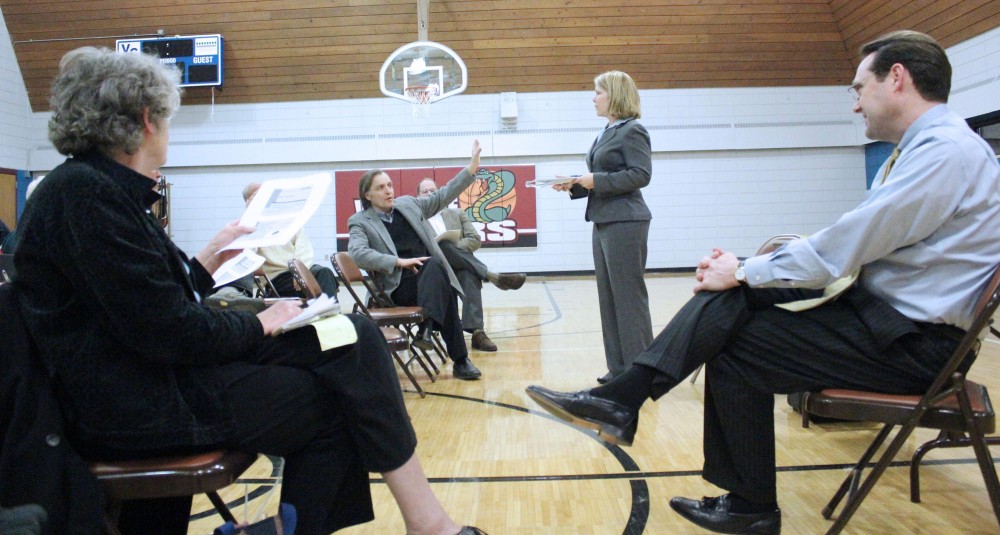From the freshly varnished gymnasium at Van Cleve Community Center, a group of about 15 residents from MinneapolisâÄô wards one and two voiced their concerns late Wednesday evening about Mayor R.T. RybakâÄôs proposed 2012 budget.
The town hall budget meeting included a brief overview of the 2012 budget from several city officials and frequent questions from residents.
Discussions ranged from concerns over police layoffs to funding for major Minneapolis venues like the Minneapolis Convention Center and the Target Center.
City Councilman Cam Gordon related with many of the residentsâÄô concerns.
âÄúItâÄôs tough and difficult times in the whole economy city-wide, so people in their own lives are doing the best they can to get by, and weâÄôre doing the same thing here,âÄù Gordon said.
Less federal and state funding as well as RybakâÄôs decision to not raise property taxes for the first time in nearly a decade means the 2012 city budget calls for heavy spending cuts and lay-offs for 104 city employees, Gordon said.
Gordon, who co-hosted the meeting with fellow Councilman Kevin Reich, said he hoped the Board of Estimate and Taxation would approve a 2 percent levy increase so the city could reduce the number of layoffs.
âÄúI have concerns [about the layoffs]. I donâÄôt know that thatâÄôs the right thing for the economy or the city,âÄù Gordon said.
Though property taxes have remained flat in the city budget, some homeowners, especially those who own higher-value homes and businesses, will see an increase due to the state LegislatureâÄôs elimination of a key tax credit.
The Prospect Park East River Road neighborhood will have the highest percentage of homes hit by a property tax increase, according to city estimates.
RybakâÄôs budget also calls for borrowing $57 million over five years to repair city streets, in addition to the $93 million the city has already budgeted for improvements.
The city can afford to borrow the money because it has recently restored its AAA credit rating, Rybak said when he introduced the budget in early September.
The budget will also heavily focus on reducing minority unemployment.
A 2009 study from the Economic Policy Institute revealed that the gap between white and black unemployment rates in the Twin Cities âÄî 6.6 percent and 20.4 percent, respectively âÄî was the largest among major metro areas in the nation.
Gordon, who represents several neighborhoods surrounding the University of Minnesota, said that important people are involved in the budget process so the city can take their opinions into consideration when the budget is discussed.
âÄúI think we are getting dangerously close to not being able to provide the kinds of services that people expect [from the city],âÄù Gordon said. âÄúItâÄôs going to be important for people to look at [the budget] and share their concerns and issues.âÄù
Every city department will meet with the Ways and Means Budget Committee to address the impact the budget will have on their respective departments.
There will be two budget hearings open to the public on Nov. 30 and Dec. 14 before the budget will come to a final vote in the City Council on Dec. 14.
âÄúThis is a proposed budget; things can still be changed,âÄù Reich said.
p clas�oo�WgH�ge=’line-height:normal’>âÄúWeâÄôre optimistic that something will come out of it this year,âÄù she said.
rom h�(lsH�gp�
Even if more students showed an interest in living near the St. Paul campus, they might struggle to find places to live.
The neighbors would probably need to be assured that students would maintain their clean and quiet lifestyles, without being too rowdy or noisy, said Wayne Groff, a realtor with Edina Realty in Roseville, Minn.
Groff agreed there is a market for student housing, but since most homes in the area are fairly expensive âÄî $300,000 to $400,000 âÄî most owners would not purchase them to rent them. He also said there isnâÄôt much land in the area to make any new developments around campus.
Even the way people search for housing is different near the St. Paul campus, Groff said. The easiest way to find housing isn’t to look on Craigslist âÄî itâÄôs to put your name and number on a bulletin board outside a coffee shop, or walk around and see whatâÄôs out there.








